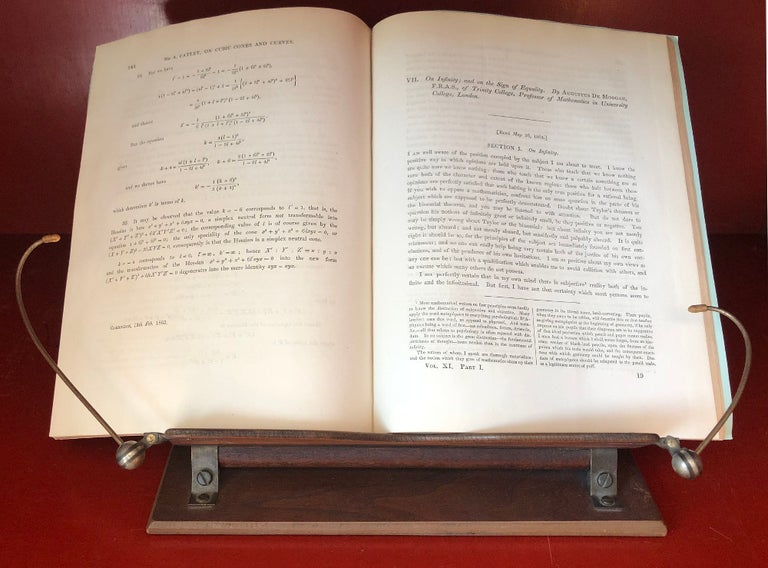On Infinity; and on the Sign of Equality (pp. 145-189) and A Theorem Relating to Neutral Series (pp. 190-202) and On the Early History of the Signs +_ and – in Transactions of the Cambridge Philosophical Society, Volume XI, Part I, 1866
Cambridge: C. J. Clay at the University Press, 1866. 1st Edition. FIRST EDITION OF THREE PAPERS BY THE 19th c. MATHEMATICIAN & LOGICIAN AUGUSTUS DE MORGAN. “De Morgan exerted a considerable influence on the development of mathematics in the nineteenth century” (DSB, IV, 35). While De Morgan’s framework was conceptual, he “was passionately concerned with mathematical rigor and wrote explicitly and extensively about mathematical foundations” (Rice, StatProb: The Encyclopedia Sponsored by Statistics and Probability).
“De Morgan “did not simply preach patience in the face of problems of interpretation that were generated from legitimate mathematical development. On the contrary, he actively searched for clear, conceptual interpretations that would resolve what he saw as the unsolved problems of mathematics” (Richards, De Morgan and the History of Mathematics, History of Science Society, 1987, 20-21). Further, he was among those mathematicians “who recognized the purely symbolic nature of algebra, and he was aware of the possibility of algebras that differ from ordinary algebra [and to some extent, these papers reflect that interest] (Britannica Biographies).
Having studied Whewell, De Morgan hoped to extend Whewell’s “historically based interpretation of the conceptual nature of science to cover mathematical development” (ibid). With this in mind, in the later part of his career, “De Morgan turned his attention for information about the nature of mathematics and its development [toward] algebra, specifically the theory of negative and impossible (what are now called imaginary) numbers. The origin and development of these algebraic anomalies was a major interest to which he devoted several scholarly articles", those offered here among them (ibid).
“De Morgan's paper on equality [included here] and others like it [references the other two papers included here] are striking expressions of his lifelong determination to resist attempts to tamper with historical processes by those who would rationally control and define mathematical development. In 1865, he wrote to J. S. Mill: ‘With regard to the acceptance of . .. [Peacock's] system, the time is not yet come. The algebraists almost all make algebra obey their preconceived notions.... So long as an algebraist has preconceptions which his science must obey, so long is he incapable of true generalization.’
“For De Morgan, restrictive axiomatic systems were the embodiment of preconceptions that turned mathematical attention away from the central problems, like generalizing the equals sign. Such true generalization was what Peacock's principle of equivalent forms had promised, it was the direction wherein mathematical progress lay, and it remained De Morgan's goal throughout his life. In the same letter to Mill he noted: ‘It is my taste, if you please, that I will have a formal algebra, in which every form, every law of transformation is universal.’ By this he meant that every symbolic form thrown up by the manipulation of mathematical signs could be given a meaning that would render the whole structure comprehensible” (ibid 29).
ALSO included in this issue of Transactions of the Cambridge Philosophical Society: Four papers by Arthur Cayley, “On the Theory of Involution,” “On a Case of the Involution of Cubic Curves,” “On the Classification of Cubic Curves,” and “On Cubic Cones and Curves”. [Note that we offer other Cayley papers separately]. Also included: G. J. Humphry “On the Growth of the Jaws”. C. I. Akin “On the Origin of Electricity”. R. B. Clifton “Note on Professor De Morgan’s Paper entitled ‘On the Early History of the Signs + and –“. Item #1056
CONDITION & DETAILS: Cambridge: C. J. Clay at the University Press. One complete issue of Transactions of the Cambridge Philosophical Society, Volume XI Part I. This was not an institutional copy and bears no stamps whatsoever. The original outer wrap is not present, but the title page, contents, and two plates are. The text block is tight, solid and housed in modern blue paper with a paper label. The text is bright and very clean throughout.
Price: $150.00

